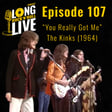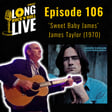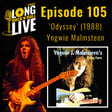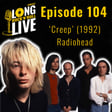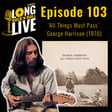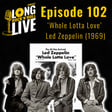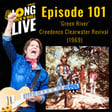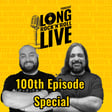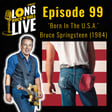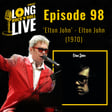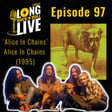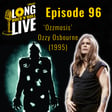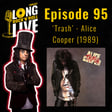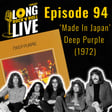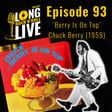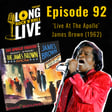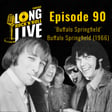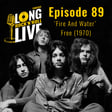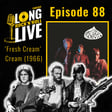Introduction and Overview
00:00:00
Speaker
Hello and welcome back to the Long Live Rock and Roll Podcast. The freewheeling Bob Dylan marked a significant turning point in Dylan's career and folk music in general. Dylan's transition from traditional folk songs to original songwriting revolutionized folk music, introducing a new era of the singer-songwriter. The album's socially and politically charged lyrics addressed contemporary issues, influencing the civil rights movement and anti-war protests.
00:00:27
Speaker
Its enduring popularity and influence on music, culture and society established Dylan as the voice of his generation and cemented its legacy as one of the greatest and most important albums of all time.
Meet the Hosts and Podcast Goals
00:00:39
Speaker
Joining me to discuss this album is my co-host, Mr Felipe Amorim. How are you doing, man? Doing great, and you, man? Yeah, very well. Thank you very well.
00:00:47
Speaker
ah Folk music, I'm quite excited. see you like folk music there I feel like yeah we did maybe you could say we did a bit of folk music with Genesis maybe, you know, but that's still prog rock, isn't it? um But yeah, anyway, let's jump straight in. So just a reminder, please, if you're watching us on YouTube, please give us a like on this video and hit subscribe. So you stay up to date with our content. And if you're listening on Spotify, Amazon or Apple,
00:01:09
Speaker
Do us a massive favor and give us a review. It takes 20 seconds of your time, but does the world of good for us as we're an independent podcast who do this for our absolute and undying love for music. And your quick review will give us better ratings, which means the algorithm takes us higher up the charts and means we are seen by more people. So please do us that favor. We'd really appreciate it.
Key Facts About 'The Freewheelin' Bob Dylan'
00:01:29
Speaker
So the freewheeling Bob Dylan, some quick facts about it. So it was released May 27th, 1963.
00:01:36
Speaker
recorded over the course of one year between April 24th, 1962 and April 24th, 1963. That's crazy to me how the same day, apparently. The studio recorded that. It was recorded. That was the Columbia A Studios in New York City. And the general genre is folk, although I've seen blues mentioned and we'll touch on that. The length of the album is just under 45 minutes and it was released through Columbia with producers John Hammond and Tom Wilson.
Bob Dylan's Early Career and Influences
00:02:04
Speaker
So yeah, this album, I just want to start off with a bit of background in terms of where we were and where Bob Dylan was by the time this album came out. So before the freewheeling Bob Dylan, this was his second album, wasn't it? And before that, he was known primarily as a performer of traditional folk songs, wasn't he? He did covers, I think his first album, there was 13 tracks and 11 of them were covers of traditional folk songs and two of them were originals.
00:02:31
Speaker
um And in 1961, so two years before this album, one year before the writing and recording of it, he moved to New York City, where he was deeply, deeply influenced by the social issues going around at the time. And that's what we're going to go into first, the lyrics and the politics. So do you want to kick us off?
00:02:48
Speaker
Yeah, I think when you said folk music, and I think it's it's ah it's proper folk music, isn't it? Because it's acoustic guitar, harmonica, and vocals, and that's the essence of the album. This is kind of, um ah well, before we talk about the the political side of it, I would say that um this is before he went electric, before, you know, people some people criticized him a lot when he added electric guitars,
00:03:15
Speaker
and you know he had the band the band the band ah playing with him and all that stuff so that's that's before he was a big name in the industry and he also had to prove himself with this album the label wanted to to drop him right because they didn't like the first album and was it was John Hammond who who who produced the album and actually is the guy who signed him for the label. Let me just double check if i if I'm right about this.
Analyzing Political and Social Themes
00:03:41
Speaker
Yeah, the producers, John Hammond and Tom Wilson. Yeah, John Hammond was the guy who got Dylan signed with with the label and he convinced them to give him another chance with this album. So that's that's his like ah second chance with the label. who The label wasn't happy. He wasn't yeah the famous Bob Dylan we know now. So it's kind of ah an interesting context that generated the yeah
00:04:02
Speaker
the album. ah not Not an easy time in his life, I'd say. And yeah, so i not an easy time for America, you know, ah post the Second World War, you the whole the whole um fear of nuclear ah apocalypse with the the Cold War and other stuff. and ah And I think he managed to capture that. When you say he's the voice of his generation, that's the the political side of it. And ah he doesn't like that. He doesn't like being called the voice of a generation. I think his he just felt like a guy doing what he loved.
00:04:35
Speaker
Exactly. And maybe because he's a guy with the guitar, you know, singing about ah things that everyone was talking about. Yeah. So he said he's a regular guy who happened to have a yeah louder voice. And he was really, really good with words. Yeah, so of course, he became the voice of a generation either he wants it ah to to be the the label for him or not. that's that's That's how he will be remembered, I guess. yeah ah But yeah, so I think the interesting thing about the political side of it is, as I said, he he was getting a lot of influence from traditional ah folk music, English folk folk music, and some of his melodies are
History of Folk Music and Dylan's Impact
00:05:14
Speaker
borrowed from those songs. We say borrowed, really, because like ah plagiarism is a complicated thing, especially when we're talking about folk music and blues and other styles. And he would pick melodies from from folk songs and kind of change them slightly and change the lyrics and and come up with his own version of it.
00:05:29
Speaker
But he is not entirely political. He was talking about ah the issues of the time. And one thing i want to ah one subject I want to touch about, the yeah the social issues, I guess, I think one major thing is is his approach on war. Because up to this day, we have the same ah the same sort of structure ah political structure leading to wars, which is like a bunch of rich old men ah with their plans, with their you know what they believe is the best thing for the world or the best thing for them. And they create the structure that leads to war. So basically he Dylan talks about building to destroy. That's what they do. They build it up so they can they can destroy. it There's a really beautiful line in this in the third song called Masters of the masters of War. yeah
00:06:15
Speaker
Yeah, you put a gun in my hands and you hide from my eyes. So that is, that for me sums up what the war is as politicians and and and the so-called important people with a lot of money and influence. They start the war and they give you the gun, go there and fight for whatever ideology I came up with so you can die and I'll be happy, you know, sitting on my chair and, and you know, in my expensive mention somewhere. So I think he he he goes straight to the point, there's not much to interpret from that song, you know, it's all said, like straight in your face. And I don't know, um um you know, we we talk a lot about ah freedom of speech nowadays and everything. I don't know how was was it for him to say this at that time, if he felt like, well, am I going to be in danger for saying these things or
00:07:04
Speaker
I've got the perfect thing. cause it Can I answer that? Yeah, yeah, yeah. I'm going to answer it with a little bit of history of folk music because it's going to tie in your city. So folk music, this is probably the first time I think, isn't it, on this podcast, we've got an out and out folk album. yeah And what we mean i mean what what do we mean by folk? We don't want to dwell on this too long, but I think of very folk music instruments. I think of a guitar, a banjo,
00:07:28
Speaker
you know, the lute and I think medieval British music from the 1600s, the 1500s. That's what I think of as folk. And then obviously it's been passed down the generations. yeah So I've done a little bit of research on the history of folk music. And obviously I've by no means touched every, you know, every aspect of it, but the generalized history of American folk music. So I'll go through this quickly and you'll see actually, it's it's before Dylan, it started intertwining with politics. It's really cool. Check this out. So 1600s, yes, we are going back that far, the 1600s. European immigrants mainly from Britain began settling in the newly discovered United States of America, bringing their musical traditions, including ballads, work songs and spiritual music with them. In the 1700s, they'd adapted to their new environment, blending through different traditions from the European countries that came over to the US, as well as African-American influence and traditions that also came over from Africa to the US.
00:08:24
Speaker
Now in the 1800s, you have a continuation of these traditions passed down orally through generations reflecting on everyday life, the struggles of working class people. That's the important part.
00:08:35
Speaker
In the 1800s, these folk songs became about the struggle of the working class. ah But as well as this in the 1800s, you started incorporating historical events into songs like the Civil War, like the struggles, you know, like we were saying. Now, the early 1900s, and you and me studied this at university, um John and Alan Lomax were two ethnomusicologists. What a word, ethnomusicologist. So obviously... Sounds important. It does. doesn't It actually is. ethnic, so ethno-ethnic musicologists, so studying the history of different ethnicities in the music. In the early 1900s, they went around, all around the US, documenting and recording ah folk songs from around the different parts of America. If I'm not mistaken, they discovered muddy waters.
00:09:21
Speaker
No, I think they discovered Leadbelly for sure. That is thought the thing where the waters was influenced by those records. OK, maybe. i yeah Yeah. Anyway, it's like actually you can date ah you can date back to to that ah time. if If you want
The Political Influence of Folk Music in the 1960s
00:09:38
Speaker
to if you want to talk about any pop singer, any rock singer nowadays, um they all have an influence. or Somehow they are directly or indirectly influenced by the Lomaxes, Lomax. um it is the basis as Felipe has just said it is the base of all popular western music because once they started recording these it just expanded you started off with small folk and blues and as you guys know from blues we got rock and from folk we get this and it just went on so yeah you're right
00:10:08
Speaker
um But anyway, if they went around, they started recording everyone and documenting these folk songs. Now in the 1930s, the new wave of folk revived that spoke to the struggles of common people. So this is a hundred years after we first started seeing. So we have a new wave of folk. A new wave of folk in the 1930s. Songs like Woody Guthrie's This Land is Your Land um were quite prominent.
00:10:31
Speaker
As I usually say in every episode, if you're new to this, every song we mention in this episode will be in a dedicated playlist in the show notes below. So go down, click the playlist and you can kind of listen along with us. 1940s folk, Woody Guthrie, Pete Seeger, Lead Belly emerge as hugely influential folk revival figures, popularizing it and associating it with labour movements, civil rights movements and anti-war protests.
00:10:56
Speaker
Now in the 1950s, because of this, many folk musicians became blacklisted due to their leftist political affiliations. um so But folks still managed to thrive in the underground scenes. And in the 1960s, one of those underground scenes was Greenwich Village in New York City, which became a hub for folk music's 60s revival. Bob Dylan, Joan Byers, Phil Ox, all these guys were sort of playing in these underground Greenwich scene.
00:11:23
Speaker
You still had the period of massive social and political unrest in the United States, but folk music surged among students in colleges as music was starting to tackle social issues. So they got on board with it. um And I think just relate to this at this album, the civil rights movement, as I already said, was gaining momentum and songs like Oxford Town in this album really demonstrate how active he was in trying to put ah put across his political views.
00:11:51
Speaker
So there you go, that's a very quick history of folk music from the 1600s to the 1960s. But I think, it you know, like I said, I haven't touched everything, but it it touches the most important parts, right? And it and it because yeah and you can see how he ah is ah basically continuing the ah the tradition. he's not he' not um ah Well, he's not reinventing the wheel, right? He's just doing his own thing with ah coming from a known tradition of telling and stories about ah ah the daily lives of common people.
00:12:25
Speaker
Yeah, through music. So music is an instrument. So that's that's why maybe so simple, because it's quite interesting that apart from the song Corinna Corinna, there's no other musicians involved in the album, isn't it? It's one song with a band and the rest of the album is Dylan on his own. Harmon the choral guitar. Which I said a million times in this podcast, you prove that you're a good songwriter if you can play your song with an acoustic guitar or piano only and it still sounds good. Yeah, I completely agree. So the album is all about storytelling. Yeah, I agree with that. There's no cheating. There's no like, I'm going to like do this amazing production with orchestras and this and that. So to make me sound good. It's just Dylan and his stories and his view of the world.
00:13:13
Speaker
Don't you think it's more about listen to the words I'm saying as opposed to the music I'm playing? And I think we've often discussed, haven't we, that is Bob Dylan the musician? Obviously, because he he writes and makes music. But is he a musician properly or is he a poet that learnt to put music behind his words? I think that's an interesting debate we can have one day.
00:13:31
Speaker
on another episode but talking of the words obviously we said you know not all of the album is political no not the ones that matter and the reason this album is such a hugely important album politically, societally and musically is because of the songs that are political so you've got blowing in the wind which talks about the nature of war and inequality i mean that's that was the first ever Bob Dylan song i heard actually yeah masters of war as you said is a criticism of the arms industry and those who profit from war Oxford Town addresses racial tensions and inequality in the South USA. And there is literally, what's the line? He says, I can't remember it. It's like he's I'm not going to try and remember it, but he says, like, you can't do this or that because of the color of your skin. And then in the second verse, it's like you can't do this because you have black skin or brown skin. And it's straight to the point. Yeah, it is. And it's basically
00:14:25
Speaker
put it himself and in that guy's position. It's like someone else's point of view. yeah So this black man goes to a new town and he's not welcome there because it's black. So yeah the way he tells the story, it makes you feel like, oh, that's how it feels. Obviously, you you can never know how someone else feels. yeah But it gives you an idea of how it it must have been to be that person in that
Themes and Storytelling in Dylan's Songs
00:14:49
Speaker
situation. and but Even though it's probably yes probably not one like is' not a real story about a specific person, might it might not be, but it's a story that happened to millions of people. so didn't Didn't it feel horrible to you as a listener? Yeah, it's it's shocking. thats and i think It's not nice. And the thing is, when you touch and ah those subjects like this, and the song I've mentioned, are the third song of the album, Masters of War, it it makes you think about, okay, there's inequality out there, there's the fear of another world war that can be even worse than the second one,
00:15:18
Speaker
So all that stuff. And he gets a bit heavy. So I love the fact that he brings a bit of humor to his music as well. The last the last couple of songs, are that there's a lot of it and it's very light hearted. And I think um track 12, Honey, just allow me one more chance. is hilarious go to check this is yeah so so It's it's good to hear some of that stuff, but because again, that storytelling, it you must remember, even in periods of a lot of tension and wars and civil unrest, people still go out to dance, to drink, to have a good time to enjoy and and to enjoy music. So some of those songs about like, this is like, ah you know,
00:15:58
Speaker
ordinary people ah like like the ah I think there the last song is a drunk man, isn't it, like talking about all the all the other the the funny things that happened to him when he was drunk. So it's cool to have that in Diablo. I think I would, ah I'll be honest with you, I love all the political stuff, but I think I wouldn't feel good at the end of the album if there wasn't a little bit of humor, a little bit of, you know. I mean, just just look at that song, A Hard Rain's Gonna Fall. The lyrical stuff in that is nuts. Catastrophic damage by war, dozens dead, social injustice of marginalized groups. What is he saying something about? He sees the downfall of seven forests or something, and he's talking about like a forest on each of the continents.
00:16:44
Speaker
my god and then you know follow up with with god on our side um which i think is a really important song actually because he criticizes the use of religion and patriotism to justify war and violence so it is overall a massively whilst he does talk about marginalized uh societies and minorities and how you know the life of a black person living in usa in that time i feel like the overriding message is war equals bad Yeah. It's very heavy. Yeah, exactly. Yeah, yeah. And equality as as a thing like, a sub sub yeah, as yeah as as as something that would say, um you know, like, why do some people have to struggle, ah instead of having the same ah chances and opportunities as everyone else, or or being treated equally as well. So that is that's definitely a big part
In-Depth Look at Iconic Songs
00:17:33
Speaker
of it. But I think as' it's, it's, it's not,
00:17:37
Speaker
ah in some ways it's like pointing a finger at society and kind of trying to shake things up a little bit like guys let's pay attention to these things they are they are going on right in front of you yeah and I want to I want to mention that the the the single Blowing in the Wind because uh everyone knows the song is a beautiful song and what I like about it is it's a little bit more open because it's not uh targeting one um aspect of ah of the social issues at a time is basically saying there's some wrong things going on there and you know they're happening so don't turn a blind eye
00:18:18
Speaker
and And if you're looking for an answer, it's blowing in the wind, right? So it's there. it so So the thing is, it's not like it's not like we're not capable of changing things or changing ourselves. It's not like ah it's ah you need to um to go really far to find the answers for your own problems or whatever. What I think think is good about blowing in the wind, because it's a bit more open and and and not so straight to the point, I would say, ah it can be interpreted in a million different ways. And it may it might be a good song for you to reflect on your own life. You know, how many more things should happen to you until you take control over your life? It could be interpreted like that as well. That's a great point. And I think he he he doesn't. what What a lot of musical musicians and people who really political do is they they tell you how they're feeling.
00:19:05
Speaker
and they make it clear that I disagree with this. Whereas I feel like in a bunch of these songs, Bob Dylan is saying, well, I might feel this way, but how do you feel about it? yep Tell me, what do you think of all this stuff that's going on? And I think that's really good because he pushes it back on the listener.
00:19:19
Speaker
Yeah, and not giving you the answer. Where is the answer? You've got yeah do you go to find the answer. no I'm not giving it to you. yeah um you Anything else you want to talk about lyrically,
Dylan's Blues Influences and Vocal Style
00:19:28
Speaker
politically? oh Just one song um down the highway. That one, isn't that one, isn't it? bit Yeah, it it's exactly because that's me. and I need to I need to touch on the subject of blues, of course. ah So that is ah is an interesting one because it's a conversation between the guitar and vocals like it is phrasing on guitar and then singing something. And there's something he said.
00:19:50
Speaker
about his blues influences and the blues singers and he said the ah the the great names of of the blues they've managed to write songs in a way that the new generation what he called the new generation of the time couldn't do which which is the blues would be about their personal struggles but they would be standing outside that situation observing it and and defeating the ah the you know the enemy whatever the enemy was like. So maybe what it basically said about the great blues singers at the time was like they they would be analyzing their own problems, complaining about them of course, but ultimately
00:20:31
Speaker
overcoming the the the the problems and becoming makes me we said stronger. yeah And whilst, ah it according to Dylan, then the the next generation of Blues was was just about moaning about stuff and not actually taking action and not actually changing your life. Well let's talk about the moaning and let's move on to the musical characteristics because Bob Dylan is known for his nasally voice. And it's, let's be honest, let's just be honest. We love Bob Dylan for what he's done, but he's not the best singer. We know this. And I mean, is he even a singer? You know, does does he talk more than he sings? And I thought that was really interesting, especially on some of the songs like the Down to the Highway one, um a few others where he had this real conversational aspect to his voice. But not only that, things he was doing like, there's one of the songs like, I wish I wrote it down. I can't remember where he he goes like,
00:21:21
Speaker
He does this sound with his voice where he goes like, yeah, and I just thought that sounds like Leadbelly. It sounds like an old blues singer. So I think it's fantastic because i that up up until this album, I've never heard or seen the connection between 1930s blues and 1960s folk music.
00:21:41
Speaker
because I see how the blues then went on to rock and I see how folk went on to do this. But I've never connected them, even though in that history, John and Alan Lomax, they went and got the blues artists as well. It was blues and folk they did. And I never saw how they connected by seeing it now with Bob Dylan literally taking vocal influences from it. yeah Most of the songs, he does something that I'd expect Leadbelly to do or, yeah you know, ah Muddy Waters, a kind of vocal style, a vocal phrase he does. Even that part,
00:22:09
Speaker
I think it's at the very end of the very song where he's like, not all of you can be right, but some of you be wrong. I think Abe Lincoln said that. And it's like, he's literally having a conversation. And I thought, if you hear Bob Dylan in the later 60s or into the 70s, it's much more or less of that.
00:22:25
Speaker
So it's interesting now, because when you think about the the vocal style and the cover conversational kind of voice, um that is something that no one could do like him
The Art of Emotional Delivery in Music
00:22:34
Speaker
as well. So if is's think if you analyze his vocals under the technical point of view, and that's something I said to some friends of mine long ago when they started doing those TV shows like The Voice and all that stuff. I'll tell you this, guys like Bob Dylan or Mark Knopfler,
00:22:51
Speaker
or you know they they would never win one of those tv contexts because it's like all right it's all about have like ah reaching the highest note and staying there for as long as possible with loads of vibratos and all that stuff like well does that make you a good singer yeah technically but uh is that like, does that emotionally connect with the audience? Can you write a song as well? Can you just sing someone else a song, ah you know, with more ah technical yeah prowess? Yeah, prowess. Yeah, exactly. So so is is it like,
00:23:26
Speaker
Is it necessary to be extremely good technically to deliver a message? I think it depends on the style, depends on what what you're doing, and I think we have to have people like Dylan ah singing with their own unique voice and delivering a message that's more important than anything else.
00:23:45
Speaker
You wouldn't change it for anything, would you? Despite how sometimes it does great. I love all the people singing his music as well. But you know what? You know what is interesting? I think ah the band does a great job singing his stuff. But I think there's there's something special about Jimi Hendrix when he does ah Dylan for one.
00:24:05
Speaker
simple reason. He also has a conversational kind of vocal, although his voice sounds nothing like Dylan. Great point. Jimi Hendrix ah approach to singing was really laid back as well. So it's not, it's not like he wasn't trying to. but Yeah. So maybe so you have the guitar you have the band they have all that kind of ah on music. um How can I put it? there you You have a stronger kind of ah ah background music there going on with guitar, bass and drums. But the voice doesn't actually try. Hendrix's voice wasn't taking the music in a completely different direction. He was just making Dylan sound more like Dylan. And that's why Dylan loved his versions of of his songs anyway.
00:24:45
Speaker
That's a great point. Yeah. um So back to the musical characteristics. I mean, it's so obvious we don't need to talk too much about it. It's just guitar and harmonica for the most part of it. And I think the rawness and how stripped down it is, is what makes this so connecting to the audience. you can It's like he's playing in your living room. It's like it's simple yet effective playing. It's a solid foundation for his lyrics. You know, he's got to do it well on the guitar for his his lyrics and the so the singing to carry weight. He's got to lay a solid bass on the guitar and he does that.
00:25:13
Speaker
um Like I said before, I think the emphasis is on the message of the songs more than than the importance of the content and the emotion. so yeah Anyway, shall we now move on? Let's talk about the innovations of this album, because we need to know, or maybe our listeners want to know, why this is the great why this is considered one of the greatest albums of all time. And we've already mentioned things.
00:25:33
Speaker
like the strength of the lyrics, the political affiliation it has, um how stripped back it was. But I want to talk about three things here. This is the introduction of original songwriting and folk music. Because as I mentioned, the little history thing, you've got songs being passed down generation to generation. And no one knows who wrote those songs. No one knows because they came from the 1600s, they were bought over from England or from Africa.
00:25:56
Speaker
And the words lyrics have been changed to suit the situation every hundred years, maybe. But in his debut album, 11 of his 13 tracks were covers. In this one, they're all his own. I think I think they're all his own. I'll double check that. But yeah, but the majority of this album are hit are his own for
Original Songwriting and Artistic Cohesion
00:26:14
Speaker
sure. And that's really important because it shifted from traditional folk to original folk. And it just it just everything went off from there.
00:26:24
Speaker
And that'll actually lead me on to my next point about the innovation, the influence on the singer-songwriter movement. Bob Dylan kicked off what we know to be the singer-songwriter movement. Anyone you can think of that came afterwards, my favourites, I go to Carole King, James Taylor, Cat Stevens, all of these guys. Bob Dylan kicked it off by saying, start writing your own songs. What also he did is he connected folk to pop music because his folk music became popular, evidently it ticks both boxes, pop and folk.
00:26:56
Speaker
And that's where people like James Taylor and Carole King, especially in America, you've got guys like Cat Stevens over in England doing the same thing, but that's where in America it mainly kicked off.
00:27:07
Speaker
and it' it could have and their guitar or piano writing songs from the heart as opposed to thinking about the big production behind them. Exactly. And there's ah there's something interesting. He could have gone down another path by just like, well, I've got a bunch of good songs here. I'm going to ah go to the label and try to sell these to the label you know in a way. like maybe see if one of their singers will sing this because that's still obviously done in music nowadays but it was a big thing back in the day where songwriters and artists would be different people. You have one person writing for the other person to sing and they said no I'm singing my own songs that's my thing. you know
00:27:46
Speaker
Yeah. And just to confirm, ah two tracks are not written by Dylan on this album. Karina Karina is a traditional one. So it doesn't we don't even know the writer because it came from so long ago. And Honey just allowed me one more chance. He wrote alongside Henry Thomas. um So yeah, it was bit Dylan and Henry Thomas who wrote that together.
00:28:05
Speaker
um Excellent, right, so the innovations are pioneering, I think I finished what I wanted to say on there, let me just go to my notes. Oh yeah, and the last part is establishing the album as an artistic statement. As you just mentioned, we're used to hearing Elvis have songs written for him, him sing them and they go out as singles.
00:28:24
Speaker
But this is, again, the early the early beginnings of finding someone who said, I'm going to write a collection of songs. They're not all going to be hits. They're going to have different themes, different lyrical ideas. I'm going to put them on one album for
Album Cover Art and Cultural Reflection
00:28:37
Speaker
everyone. And we saw only what three or four years later, The Beatles did it with Rubber Soul, where they said,
00:28:42
Speaker
We don't care so much about hits. We care about the collection of songs. This is what my life was like at this time. This is what me and the world are going through. Take these collections of songs as for what they all individually are, as well as collectively. um So yeah, treating the album as a cohesive statement.
00:28:59
Speaker
And the artwork reflects all all of it all of those things you just said because basically, ah so this is an interesting, what I have on my background is not the album cover, it's one of the outtakes of the album cover and it's interesting because basically ah ah the photographer ah was sent by the label to go to Dillon's flat in New York and take a few pictures of him So you can find those pictures on the Internet, like there's a lot of pictures of him playing his guitar, trying different hats, you know, it's like kind of trying to do something more well produced, ah you know, coming up with whatever concept, but the but they wanted to show Dylan in his own environment. But his his girlfriend, Suze Rottolo, she was living in Italy, studying art in Italy, and she moved to America and moved into his flat.
00:29:47
Speaker
And she was there. So it wasn't planned that she would be in the album cover with him. She was there in the flat. And some of the pictures, ah you know, he he wanted to take by her side. And then at some point, the photographer said, let's go out in the streets and because like the flatters choose more. I want to see you you like with I want to use more of the background. There's no space here. And this beautiful picture of the two of them ah walking side by side like in New York is is this is a lovely picture. I think that could be ah That picture on it on itself, it it's a great um piece of art, I think. It's beautifully taken. And it does reflect a young man in America at that time with his girlfriend in the
Legacy and Recognition of Dylan's Work
00:30:32
Speaker
streets. And he's like, and you can see, and I don't know, I think his um his body language shows a little bit of, how can I put it, like uncertainty. you know Yeah, I see that. And I also see modesty.
00:30:47
Speaker
I see if you imagine but a picture, up I'm imagining Bob Dylan, 10 albums in with all this money. You take a photo, you're like this, surely. You're flexing. Yeah. Yeah. Bob. He's just you know hunched over a bit modest, a bit humble. He's still a guy finding his way through the world. Yeah. Yeah. Great point about the art. That could have been any other couple in New York. Exactly. it's He is a common man walking down the streets of New York. It's a beautiful picture. You've spoken about this about art. And this is another thing this album does so importantly is it's not just an influence on art and politics.
00:31:18
Speaker
Poetry and Literature. Bob Dylan's lyrical style has often been compared to works of poetry. I've got some notes here. Alan Ginsberg, he's been compared compared to a poet Alan Ginsberg. I don't know who that is. I don't know what his poetry is like, but you've got accredited experts in these industries saying, well, hold on, actually, this guy was just writing simple folk music. His words actually remind me a lot of this poet here. um and And Bob Dylan's work has been referenced in numerous films. and numerous I mean, his own lyrics, they portray such a an imagery to them, like he's describing a film scene. Why wouldn't you take some of his music and put it in a movie? you know I mean, how much of his music has been in movies? you know
00:31:58
Speaker
um But check this out, this is the most important part and the one that I loved most. Do you know that he won a Nobel Prize in 2016? I didn't know that. No. Quotes, for having created new poetic expressions within the great American song tradition. Oh, actually, I remember when he came up in the news that he's saying, yeah, yeah. I just think that's pretty, when you think of, ah but I don't think it's undeserved. I think when you think of all the people that have won it, and yes, you talk about the scientists who cured this disease and cured that disease,
00:32:28
Speaker
This album is just so much more than a collection of songs. That's actually the first line of my monologue. So as i'm I'm plagiarizing myself. um It's so much more than a collection of songs. It is... Do you know what I'm not? Because that's just my monologue. Don't say it now.
00:32:45
Speaker
i just about winning a noble prize yeah ah yeah I think it' it's it's deserved because he's bringing poetry into music and in in a way that no one has done before. So that's why it's so important. It's like, okay, I could just write a book, but I'm going to sing.
00:33:03
Speaker
yeah And I think that's what it is. And that's that sums up the album for me. That's what it is. and it could The album could have been 13 different books or 13 different movies. yeah Instead, it's 13 songs. So I think it's just... I'd love to listen to it, start to finish. um There's ah a variety of themes and it reflects life.
00:33:24
Speaker
at that specific point in time in all its complexity. It's not just the politics. It's not just love. It's not just, um you know, ah fun. It's not. It's everything that's that's his life. And that's, ah you know, ordinary people's lives ah summed up in music. It's a musical photograph, isn't it? Taken at a point in time. Yeah. Yeah. Exactly. Just in terms of the legacy.
Final Thoughts and Recommendations
00:33:48
Speaker
I mean, we've already told you that many of these people consider this album one of the greatest albums to ever have been written and released.
00:33:54
Speaker
I hope you can understand and appreciate that whilst it may not have stunning production, amazing solos, I hope we've kind of pointed you in the direction as to why this is so important. um Just some accolades it's received. you know um It was praised upon release for his ability to capture the spirit of the times, which is what you just said. um Ranked number 97 on Rolling Stone's 500 Greatest Albums. 2002, it was inducted into the Grammy Hall of Fame. ah The album peaked at 22 on the Billboard 200, which actually wasn't that high. um But as his popularity grew, the album continued to grow as well and it sold more copies.
00:34:32
Speaker
it eventually really reached platinum status selling one million copies in the USA. So yeah any final thoughts on the album? I just as usual recommend everyone to listen to it, listen to it like take your time put your headphones on or listen to at home enjoying your cup of tea or your coffee or whatever you want to do and it's like appreciate the music I think it's it's beautiful start to finish you gotta listen to the lyrics gotta pay attention to it. yeah Yeah, I just I had a great time listening. It was the first time I've listened to this whole album. The other thing I would recommend is to listen to the second track, Go From the North Country. There's a beautiful version of Johnny Cash and Bob Dylan singing it together. slower griy So slower tempo is a different vibe. And yeah, they sound amazing together. So yes, there's a million versions of it, but that's that's my favorite. Well, it is in our playlist. So as I said, go down there.
00:35:24
Speaker
Um, and check out the playlist. Uh, time for my monologue. Yes, please. There you go. Right. So before the monologue, the monologue is always the last part of the show, right? Round up my thoughts. I always have so
Summary and Closing Remarks
00:35:34
Speaker
much to say. So I try and squeeze them into a little paragraph before we do the monologue and finish, please. Just a reminder, if you're watching on YouTube, give us a like and subscribe. And if you're listening on Apple, Amazon or Spotify, go and rate us. It takes a little bit of your time, but means the world of us. So if you could do that, we'd really appreciate it.
00:35:50
Speaker
So I think the freewheelin' Bob Dylan is much more than a collection of original songs by an up-and-coming folk musician. Whilst not all the songs are politically motivated or a lyrical form of protest, it stands as a peaceful reminder that everyone has a voice. I can't imagine how your bog-standard American would have reacted to some of the lyrics we hear in the album, and not because they are right or wrong to agree or disagree with him, but to think back and imagine what was happening societally in that time It must have been quite a statement to have released some of these songs with some of these lyrics. The simplicity of the instrumentation and music allows his message to be delivered in a much more prominent way.
00:36:28
Speaker
Don't focus on his chords or melodies, focus on his words. The album is a hopeful record. Despite how dark and doomy some of the lyrical content is, I can't help but smile when I hear some of the chord progressions and the simplistic melodies being delivered by this quirky character with unusual phrasing and vocal choices. This positivity in a world full of negativity must have been why it stood out and why so many people not only enjoy his music But more importantly, rallied behind him in his political and societal pursuits for what he believed was a better future for America and ultimately the world. Beautiful. Thank you. Great album. And this is more than just a great album in time, this kickstarter career of one of the most notorious and well-known songwriters in existence in Western music altogether, right?
00:37:23
Speaker
Yeah. and know it And every single song on the album is good. That's not anything to put together. Good point. And I actually can't wait to do another Dylan album next. So maybe we do this chronologically. Maybe in a few months you'll see the next album. But yeah. Let's do some of the electric stuff. you Oh, we'll get on that. Yeah, yeah. Excellent. Cool. Right. Well, guys, thank you for joining us on another episode of the Long Live Rock and Roll Podcast. We hope you come back and join us very soon. Thanks everyone for being with us once again. Keep on rocking everyone and don't do anything I wouldn't do.
00:37:52
Speaker
and as usual take care guys and long live rock and roll.

